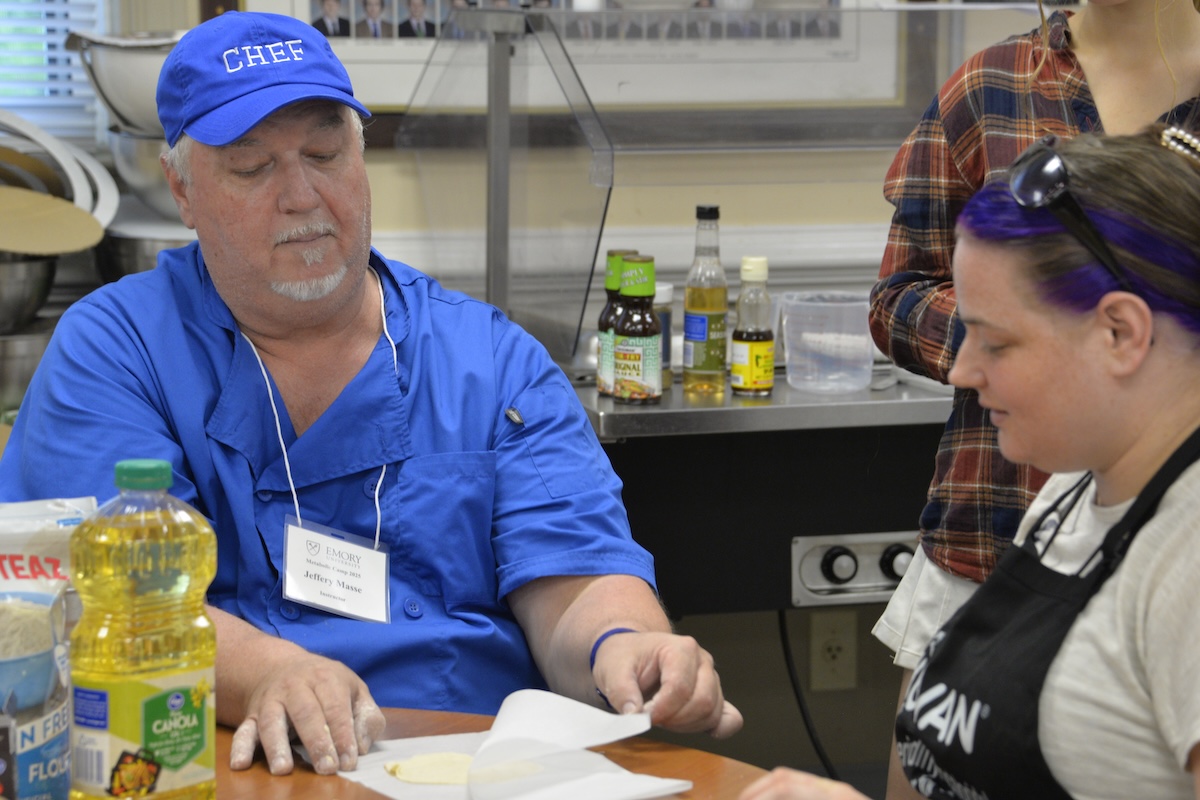Unique camp builds connection for women with rare health conditions

JUNE 2025
By Ananya Dash
When Bailey appeared on the screen holding her eight-day-old baby, the room filled with awe. Diet is a concern for many expecting mothers, but the women in the room knew that they faced special challenges.
Women with the metabolic diseases PKU and MSUD (maple syrup urine disease) lack enzymes to break down certain amino acids in their diet, so they are advised against eating protein-rich foods. They face a high risk of giving birth to children with severe developmental disabilities -- if their amino acid levels aren’t controlled before and during pregnancy. Bailey had managed her pregnancy through diligent diet control: a life-saving measure not only for herself, but for her newborn.
“It was so powerful for them to see that it is possible,” says Rani Singh, PhD, RDN, LD, professor of human genetics at Emory University. “This is why education, research, and early intervention are crucial—and why we built this camp.”
For over 30 years, a summer camp hosted by the Department of Human Genetics has brought together women from age groups 12 to 50 with PKU and MSUD. It takes place in June at two fraternity houses at Emory University for six days and offers a unique experience that blends nutrition education, peer support, and rigorous research.
While it may resemble a traditional summer camp—with activities like karaoke, dance parties, game nights, and movie theater visits---It serves a deeper purpose: equipping women with knowledge, skills, and confidence to manage lifelong dietary management and new treatments.
“The camp has tasting tables where we get to try different low-protein foods, which I find very, very helpful”, says Jewel Alexander, a returning camp participant. “Because I have struggled to find low-protein foods that I can have.”
“My favorite part has been to meet new people who know what I am going through and have the same feeling as me”, says Holland Tye, a first-time camp participant.
“There are girls in the camp who have never met another girl with a similar condition, even in the age of social media,” Singh says. “Sometimes, we do not have the funds. But we have never turned anyone away. The community they find here is invaluable.”
Many roads to becoming a mom
If amino acid levels are not managed around the time of pregnancy, a condition called maternal PKU syndrome can cause irreversible damage to a developing baby’s brain, due to high levels of phenylalanine crossing the placenta.
The need for careful metabolic control can make pregnancy and motherhood feel out of reach. But Metabolic Camp changes that perception, Singh says. With education and support, women with PKU and MSUD are shown that motherhood is possible—on their terms.
At a session led by Singh, she opened the floor to questions for previous camp participants who are mothers themselves – both in the room and online. A number of women spoke about their experiences of following low-protein diets throughout their pregnancy.
“Not all gynecologists are knowledgeable about PKU, so it is important to work with a dietitian and geneticist to get needed care and you have to advocate for yourself at the doctor’s office,” says Bailey, an Emory PKU patient who was invited to speak to current campers.
Some had followed strict diets throughout pregnancy; others opted for medications that regulate phenylalanine levels without being on a special diet, despite limited evidence on whether it can affect the baby’s health. Others talked about their decision to adopt children.
“There is no one way to become a mother with PKU”. Singh told the group.

Rethinking diet
People with PKU and MSUD depend on expensive medical foods – specialized formulas that exclude amino acids that cannot be metabolized. In addition, they have to cook specially modified low-protein foods. Cooking demonstrations at the camp are designed to make low-protein foods more approachable.
“My recipes always start with the need to steer away from the heavy use of low protein modified foods and ability to buy fresh produce and groceries,” says Chef Jeff Masse, author of a low-protein diet cookbook and a national leader in low-protein culinary education.
“Focus on what you can have, not what you can’t,” Masse tells the group.
His sessions encourage campers to rethink the limitations of their diets. Cauliflower stands in for chicken; jackfruit replaces pork in burritos. By the end, many participants are excited to recreate the recipes at home.
A platform for research
Metabolic Camp offers more than educational programs—it’s a platform for research integrated with Emory’s General Clinical Research Center (GCRC), supported by the National Institutes of Health. The camp operates under IRB approval and has become a rich source of data for understanding how nutrition affects metabolic stability and long-term health.
The camp participants track their food intake by maintaining three day diet records before they arrive at the camp and also once they are at the camp. Blood is collected on the first and last day of the camp to measure metabolic markers and correlate them with diet logs. This helps researchers assess how well participants are managing their conditions—and where additional interventions may be needed.
Both PKU and MSUD are rare inherited metabolic disorders. People with PKU cannot properly process phenylalanine, because they are deficient in the enzyme phenylalanine hydroxylase. In the case of MSUD, people are deficient in an enzyme complex that breaks down leucine, isoleucine, and valine, leading to the characteristic odor of maple syrup in infants’ urine.
In the 70s and 80s, physicians applied dietary restrictions for people with PKU and MSUD until childhood only. It was known that elevated levels of amino acids cross the blood-brain barrier and cause severe neurological defects, so children would be put on strict diets until six years of age. Mandatory newborn screening programs were implemented to allow doctors and parents to learn whether a newborn had PKU and intervene early to prevent negative health effects.
However, the need for continued dietary restrictions for people with PKU and MSUD was not fully appreciated. In 2012, Singh served on a National Institutes of Health panel that formally recommended lifelong adherence to low-protein diet to improve outcomes for individuals with PKU.
“Over time, high levels of amino acids such as phenylalanine and leucine can impair executive function and behavior,” says Rosalynn Blair, assistant camp director for 20 years. “Management has to be life-long -- not just during childhood.”

